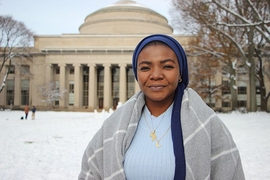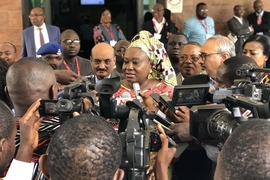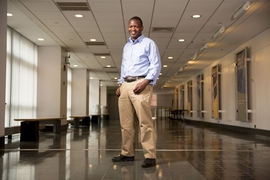MIT Professor Kenda Mutongi teaches courses in African history, world history, and gender history, and serves on the MIT Africa Working Group. She is the author of two award-winning books: “Matatu: A History of Popular Transportation in Nairobi” (University of Chicago Press, 2017) and “Worries of the Heart: Widows, Family, and Community in Kenya” (University of Chicago Press, 2007). The latter book explores how widows, a marginalized group in Kenya, weathered the country’s transition to a post-colonial society and found novel ways to address their collective social, economic, and political problems.
Mutongi, born and raised in rural Kenya, recently spoke with SHASS Communications on the interplay of African history and current gender issues within the United States; the importance of multidisciplinary thinking in solving the world's concerns; and the wider implications of her research.
Q: In “Worries of the Heart” you examine how Kenyan widows have navigated the country’s changing power structure. What lessons can be drawn from this history, two years into the #MeToo movement?
A: In that book, I argue that the patriarchal structure of society in rural western Kenya established the expectation that women would be dependent on men. Widows were generally considered weak and helpless, and yet they found ways to get their needs met.
To ensure that men supported them, widows presented their grievances to the men in public so that they could be witnessed by the whole community. By airing their grievances publicly, widows were able to put the men in a vulnerable position. Men who refused to help widows were emasculated in the eyes of others, because strong, respectable men were expected to take good care of women — especially widows.
In essence, the widows turned the very gender norms that were designed to oppress them to their own advantage. While the Kenyan widows did not overturn the patriarchal structure, they managed to refashion it to their advantage and garner the resources they needed to raise their children.
Today, I see something similar taking place in the #MeToo movement, which encourages women who have survived sexual assault and harassment to go public and expose those who have assaulted them. The assumption is that this going public will empower the women, but also send a strong message to the men about the serious consequences of their behavior. By going public, the #MeToo women are doing exactly what widows in Kenya did: They are — at least partly — trying to modify men’s behavior by shaming them, and in the process they are empowering themselves.
Reflecting on this history is important because it underscores a central truth of power dynamics: There are many ways in which populations that are not in power can make gains, even when existing societal structures are heavily stacked against them.
Q: Your latest book, “Matatu: A History of Popular Transportation in Nairobi,” provides a window into African entrepreneurship that serves as a counterpoint to the idea that African businesses need help from outsiders. What other myths do you think most need to be dispelled about Africa’s countries, cultures, and peoples?
A: One myth is that Africans are not capable of mechanical or scientific innovation. Africans are just as innovative as anybody; they just lack the capital to turn their discoveries into something bigger.
This is similar to the idea that Africans lack the entrepreneurial spirit, which can be debunked by examples such as that of Nairobi’s matatu industry. Matatus are minibuses used as shared private taxis. The success of the matatu drivers reflects wholly African entrepreneurship: The industry is thriving without any governmental or outside development assistance.
Unfortunately, Africans are often underestimated. In terms of scientific innovation, I think of my aunt, who was an herbalist when I was growing up in rural western Kenya. She searched the fields and found many herbs that could cure family members of stomach aches, flu, skin rashes, coughs, and colds. Rich drug companies such as Pfizer and Unilever use some of these same herbs — yellow dye root, rosy periwinkle, and Asiatic pennywort — in their pharmaceuticals.
My aunt certainly knew the medical significance of the herbs. What Africans like my aunt too often lack are the resources to turn their specialized knowledge into what is accepted as science in the global context. This is an important topic and one that has thoroughly been addressed in the work of my colleagues [MIT Associate Professor] Clapperton Chakanetsa Mavhunga and [MIT Program in Science, Technology and Science graduate student] Jia-Hui Lee.
We need to start taking all forms of African knowledge seriously, because until we do, we will continue to lose out on the contributions of a large swath of humanity.
Q: MIT President L. Rafael Reif has said that solving the great challenges of our time will require multidisciplinary problem-solving and “bilingual thinkers” — approaches that bring together insights and expertise from the sci/tech and humanistic fields. Can you share some ways you think knowledge from your field is important to such global problem-solving?
A: Lately I have been trying to think of African history from the perspective of goodness and basic human decency. Many of us in the humanistic disciplines have become so dedicated to examining conflict that we have reached a point where every action — arguably, even positive action — is treated as if it simply magnifies the webs of power in which we live.
And yet, I suspect that we cannot expect to change our societies for the better when no good deed is left uncriticized. Of course, conflicts exist, and do a great deal of damage in our lives, and we must confront them — but we must also allow ourselves to appreciate basic goodness and kindness when we see it.
In my own work I plan to examine more how people are working together and helping each other build stronger communities rather than focusing only on corruption and civil wars. Goodness is just as complex as evil, and yet, we tend to privilege analyses of evil. As the late Toni Morrison has noted, “Evil has a blockbuster audience; Goodness lurks backstage. Evil has vivid speech; Goodness bites its tongue.”












